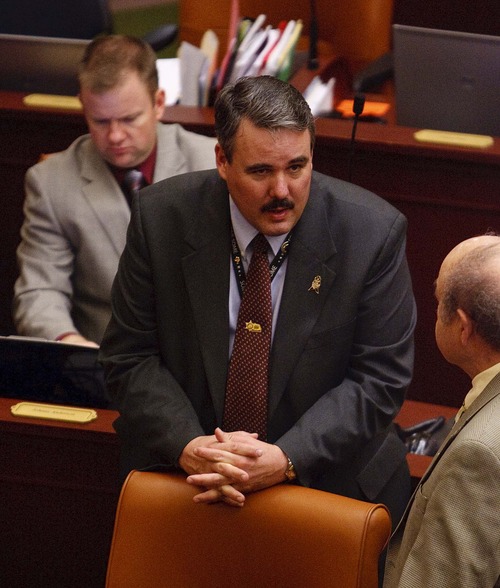This is an archived article that was published on sltrib.com in 2013, and information in the article may be outdated. It is provided only for personal research purposes and may not be reprinted.
A northern Utah lawmaker would like to amend the state constitution to give voters the ability to remove an elected official from office — a position brought to the forefront amid the scandal involving Attorney General John Swallow.
"This is a good, positive direction to go in," Rep. Lee Perry, R-Perry, said Tuesday, "because if the citizens are really frustrated with an elected official, then they ought to be able to go through this process to remove the official."
Perry said his recall proposal, which would require tweaking the Utah Constitution, was not tied to Swallow but added that the attorney general's travails reinforced his support for the change.
"Honestly, it's nothing against John Swallow," Perry said, "but I have thought about it, and it's too bad we didn't have this [recall process] in place earlier."
Whether those frustrated with the stream of allegations against the state's top cop, who took office in January, would actually be able to gather the signatures for a recall, Perry said, it should nonetheless be an option.
Nineteen states allow the recall of state officials, and at least 29 have a recall process for locally elected officials.
Utah, however, is not among them.
Currently, impeachment is virtually the only way for an elected official to be removed.
Talk of the potential impeachment of Swallow has ramped up in recent weeks, and House Republicans plan to spend their June 19 caucus focused on the impeachment process.
That same day, the Legislature's Government Operations Committee is scheduled to discuss Perry's recall proposal.
Matthew Burbank, a political scientist at the University of Utah, said many states adopted recall elections along with the initiative and referendum process as part of a progressive movement.
But the recall process has been used more in recent years to settle political scores by groups that disagree with a politician, rather than to remove an officeholder who has broken the law or is potentially corrupt.
Wisconsin experienced a bitter battle over the attempt to recall Scott Walker after the Republican governor sought to enact a series of labor reforms seen as anti-union.
Walker survived, although Democrats ousted one of four state senators forced into recall votes.
And, in 2003, frustrated California voters ousted Gov. Gray Davis and replaced him with Gov. Arnold Schwarzenegger.
"It's not clear there's a big benefit to it," Burbank said, "but if you accept the argument it's government by and for the people … it's very democratic in that sense."
Still, it would be an unexpected move for the Utah Legislature to embrace the recall movement, since in recent years it has enacted laws to make the recall's relatives — initiatives and referendums — more difficult to accomplish in the state.
"The prevailing sentiment in Utah," Burbank said, "has been in the other direction."
Perry said one of the challenges would be to ensure a recall process that provided a tool to voters, but couldn't be easily abused by political groups.
"I don't want to make it so one group can come in and kick someone out," he said, "or make it miserable for someone and go through recall again and again."
Perry expressed interest in a Montana model that allows a recall vote for a statewide officeholder if signatures are gathered from 10 percent of the eligible voters in the past election and 15 percent for local offices.
Amending the Utah Constitution to implement the recall would take a two-thirds vote by the House and Senate.
A majority of voters then would have to approve it on the 2014 ballot.
Twitter: @RobertGehrke —
Sutherland to Swallow: Resign
A leading Utah conservative think tank called Tuesday for Attorney General John Swallow to resign, saying he should put the integrity of his office before his self-interest.
"John Swallow is the chief law enforcement officer in Utah and precisely because I believe that he strives to be a man of integrity, he should step down," Paul Mero, president of the Sutherland Institute, posted on the group's website.
Mero, who said he considers Swallow a friend and a competent attorney, argued the attorney general should be presumed innocent until proven guilty. But he added there is enough evidence in various allegations to suggest "something is wrong in the Swallow case" even if it is poor judgment.
"A person of integrity holding public office would put that office before himself," Mero wrote. "... The point about integrity isn't about function as much as it is about the confidence that citizens have in the people they elect — especially the person they elect to be the state's top cop."
State Rep. Paul Ray, R-Clearfield, also has called on Swallow to step down. State Rep. Spencer Cox, R-Nephi, has said many legislators share that feeling and that the chamber should seriously consider Swallow's impeachment. Rep. Jeremy Peterson, R-Ogden, has said he believes Swallow should take a leave of absence pending the outcome of a federal and state investigation.
Swallow's spokesman has said the attorney general hasn't broken any laws and has no plans to resign.
Robert Gehrke —
Swallow allegations
• Indicted businessman Jeremy Johnson has, at times, accused Utah Attorney General John Swallow of helping to arrange to bribe Senate Majority Leader Harry Reid, D-Nev. Swallow says he only helped Johnson set up a lobbying deal.
• Lt. Gov. Greg Bell's office plans to hire a special counsel to investigate whether Swallow violated campaign financial disclosure rules.
• The Utah State Bar has at least two ethics complaints aimed at Swallow.



